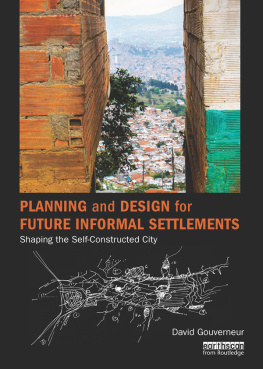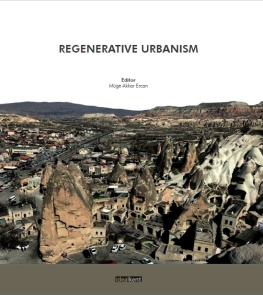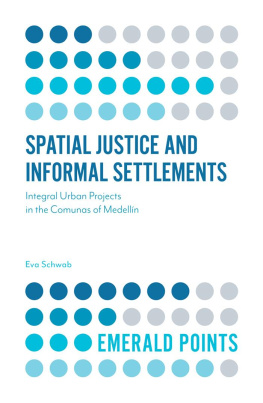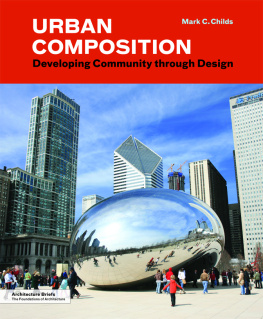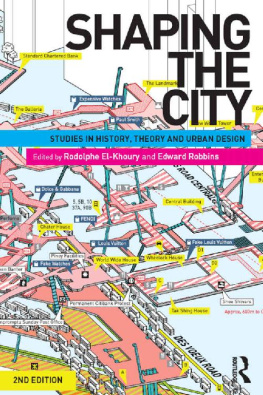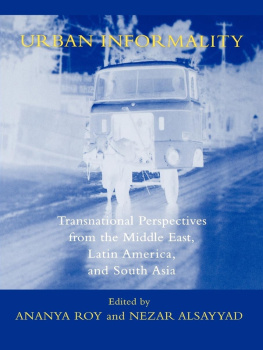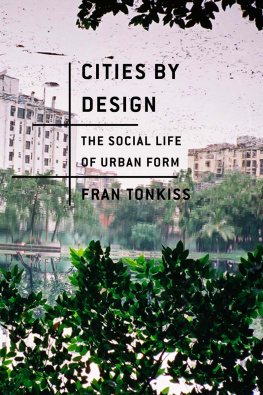Planning and Design for Future Informal Settlements
This is the first book to address future informal settlements at the global scale. It argues that to foster favorable conditions for the sustainable evolution of future informal cities, planners must consider the same issues that are paramount in formal urban developments, such as provision of:
balanced land uses
energy efficiency and mobility
water management and food sufficiency
governance and community participation
productivity and competitiveness
identity and sense of place.
Planning and Design for Future Informal Settlements makes a call for responsible action to address the urban challenges of the developing world, suggesting that the vitality of informality, coupled with spatial design and good management, can support the efficient use of resources in better places to live.
The book analyzes the strengths and weaknesses of informal urbanism and the challenges faced by the fast-growing cities of the developing world. Through case studies, it demonstrates the contributions and limitations of different attempts to plan ahead for urban growth, from the creation of formal housing and urban infrastructures for self-built dwellings to the improvement of existing informal settlements. It provides a robust framework for planners and designers, policy makers, NGOs, and local governments working to improve living conditions in developing cities.
David Gouverneur was National Director of Urban Planning for the Ministry ofUrban Development of Venezuela and co-founder of the Urban Design Programand Director of the Mayors Institute in City Design at Universidad Metropolitanain Caracas. He has 33 years experience of teaching Architecture, Urban Design,and City Planning. His professional practice focuses on urban plans for distressedneighborhoods, upgrading informal settlements, historic districts, new centralities,and areas affected by disaster. He is currently Associate Professor in Practice of theDepartment of Landscape Architecture at the University of Pennsylvania, teachingLandscape Urbanism Studios, Cross-disciplinary Design Studios, and Electives,with an emphasis on developing countries.
Planning and Design for Future Informal Settlements
Shaping the self-constructed city
David Gouverneur
First published 2015
by Routledge
2 Park Square, Milton Park, Abingdon, Oxon OX14 4RN
and by Routledge
711 Third Avenue, New York, NY 10017
Routledge is an imprint of the Taylor & Francis Group, an informa business
2015 David Gouverneur
The right of David Gouverneur to be identified as author of this work has been asserted by him in accordance with sections 77 and 78 of the Copyright, Designs and Patents Act 1988.
All rights reserved. No part of this book may be reprinted or reproduced or utilised in any form or by any electronic, mechanical, or other means, now known or hereafter invented, including photocopying and recording, or in any information storage or retrieval system, without permission in writing from the publishers.
Trademark notice: Product or corporate names may be trademarks or registered trademarks, and are used only for identification and explanation without intent to infringe.
British Library Cataloguing-in-Publication Data
A catalogue record for this book is available from the British Library
Library of Congress Cataloging-in-Publication Data
Gouverneur, David.
Planning and design for future informal settlements: shaping the
self-constructed city / David Gouverneur.
pages cm
Includes bibliographical references and index.
1. Squatter settlements--Developing countries. 2. City planning-
Developing countries. 3. Urban policy--Developing countries. I. Title.
HD7287.96.D44G68 2014
307.336dc23
2014003308
ISBN: 978-0-415-73789-0 (hbk)
ISBN: 978-1-315-76593-8 (ebk)
Typeset in Bembo Std 11/14 pt
by Fakenham Prepress Solutions, Fakenham, Norfolk NR21 8NN
Dedicated to Isabel Gouverneur and Dora Palacios
Contents
This book was a great collaborative effort from a large group of peers working in different cities, sharing their knowledge and supporting me with inexhaustible patience as the manuscript took shape. My special gratitude goes to those who toiled closely with me and offered critical feedback, theoretical references, edits, graphic production, and continuous encouragement. This team, which included some of my closest collaborators and friends, was passionately engaged in envisioning a better future for the self-constructed city.
I am honored that Professors Sergio Fajardo and Alejandro Echeverri have written the for this book. Sergio Fajardo is the former Mayor of Medelln and current Governor of the Colombian Department of Antioquia, and Alejandro Echeverri was the General Manager of La Empresa de Desarrollo Urbano de Medelln during Fajardos municipal mandate. Their contributions to Medelln were pivotal to the transformation of troubled informal settlements and overall improvement of the citys performance. Their political and urban vision had a major influence on this work.
My motivation to examine the future of informal settlements also stemmed from the creative work of talented professionals, leaders, and academics. In particular, I am thankful to Peter Land, Germn Samper, Teolinda Bolvar, Josefina Bald, Federico Villanueva, Jos Antonio Abreu, Gail Epstein, and Udo Weilacher who shared their time and insight as the book was emerging, providing invaluable feedback.
I am profoundly grateful for the mentorship and support of Marilyn Taylor, Genie Birch, Cindy Sanders, Jonathan Barnett, James Corner, Lindsay Falk, Frank Matero, David Leatherbarrow, John Dixon Hunt, and Richard Weller from the School of Design at the University of Pennsylvania.
Next, I would like to acknowledge Oscar Grauer and Mara Altagracia Villalobos, both of whom accompanied me through the entire process of producing this publication. Their help with concept development, close examination on the content of every chapter, and search of adequate and accurate sources to support the ideas here contained, certainly qualifies them as co-authors of this book. Without them this publication would not have been possible.
I would like to express my gratitude to Nuri Bofill and Aron Cohen for helping me visualize the scope of this project. Special recognition should go to Ian Sinclair and Aaron Kelly for revising the text with acute eyes as the chapters were being assembled, decanting the ideas, providing clarity and polishing the language, and to Margari Aziza Hill who carefully crafted the final edition.
I would like to thank those who collaborated with me, providing information and structure to early versions of important chapters, including Nick Pevzner, who contributed to the .
I sincerely thank David Maestres, Trevor Lee, Mara Altagracia Villalobos, Autumn Visconti, and Leonardo Robleto for the preparation of images and graphic design that enrich this book, as well as to my peers, students, and friends that provided photographic material.
I would also like to commend the faculty and students who participated in the series of exercises that helped shape and illustrate the Informal Armatures approach, and particularly to those whose work is included in the publication.
I extend my gratitude to my close friends and peers, Graciela Flores, Ximena Samper, Peter Rowe, Ken Greenberg, David Graham Shane and Theodore Eisenman, for their support and guidance.
Finally, I would like to thank my family members and extended family Elliot and Elisa Fineman, Elsa Brambilla, Mercedes Elena Torres and Ana Mara Torrico, for their love and encouragement.

